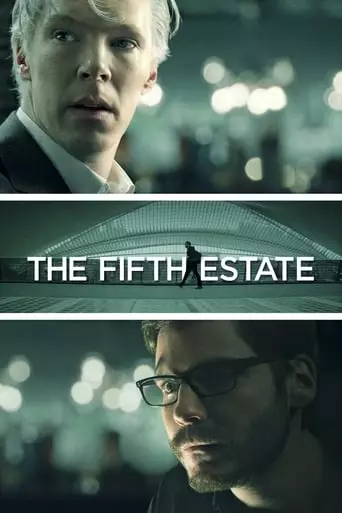A look at the relationship between WikiLeaks founder Julian Assange and his early supporter and eventual colleague Daniel Domscheit-Berg, and how the website’s growth and influence led to an irreparable rift between the two friends.
The Fifth Estate (2013) is a biographical thriller directed by Bill Condon, which explores the rise of the WikiLeaks organization and the complicated relationship between its founder, Julian Assange, and former spokesperson, Daniel Domscheit-Berg. The film is based on Domscheit-Berg’s book Inside WikiLeaks: My Time with Julian Assange at the World’s Most Dangerous Website and several other journalistic works. It offers a dramatic account of the controversial leaks that shook the global political landscape and the ethical dilemmas surrounding the publication of classified information.
The story begins with Assange’s vision of WikiLeaks as a platform to expose government and corporate corruption. Assange, portrayed by Benedict Cumberbatch, is depicted as a charismatic but increasingly erratic figure, while Daniel Domscheit-Berg, played by Daniel Brühl, starts as an enthusiastic supporter who believes in the noble cause of transparency. However, as WikiLeaks gains prominence, tensions arise between the two over the handling of sensitive information and the ethical implications of their work.
The film highlights key moments in the organization’s history, including the release of the “Collateral Murder” video, the Afghanistan and Iraq War Logs, and the US diplomatic cables. These leaks are presented as both heroic and reckless, with the narrative exploring the consequences of exposing classified material without considering the potential harm to individuals and national security. The relationship between Assange and Domscheit-Berg deteriorates as Domscheit-Berg grows disillusioned with Assange’s disregard for the safety of informants and his increasingly authoritarian behavior. Ultimately, Domscheit-Berg leaves WikiLeaks, and the film ends with Assange’s continued legal battles and the ongoing impact of WikiLeaks on global politics and journalism.
Themes and Impact of the Movie
The Fifth Estate delves into several key themes, including:
- The Ethics of Transparency: The film raises questions about the balance between transparency and privacy, particularly when it comes to leaking sensitive information that could endanger lives or national security. Assange’s uncompromising stance on releasing documents is contrasted with Domscheit-Berg’s growing concern for the consequences of such actions.
- Power and Corruption: Assange’s transformation from a visionary leader to a manipulative figure reflects the corrupting influence of power. His increasing control over WikiLeaks and his disregard for ethical boundaries highlight the dangers of unchecked authority.
- The Role of the Media: The film explores the relationship between WikiLeaks and traditional media outlets, questioning the responsibility of journalists in handling classified information and the power dynamics between whistleblowers, the press, and governments.
- The Personal vs. The Political: The personal conflict between Assange and Domscheit-Berg serves as a microcosm of the larger political struggles surrounding WikiLeaks. The film suggests that personal motivations, insecurities, and ambitions can sometimes overshadow noble causes.
- Freedom of Information vs. National Security: The central moral dilemma of the film is the conflict between the right to know and the need to protect national security. It challenges viewers to consider whether the public’s right to information justifies the potential harm caused by the leaks.
10 Reasons to Watch The Fifth Estate
- Benedict Cumberbatch’s Performance: Cumberbatch delivers a captivating portrayal of Julian Assange, capturing his eccentricities, intelligence, and volatility. His performance is one of the film’s standout features.
- A Thought-Provoking Story: The film raises important questions about the ethics of information sharing, government transparency, and the role of the media, making it a must-watch for those interested in political and social issues.
- Real-Life Relevance: The Fifth Estate is based on real events and provides insight into the controversial actions of WikiLeaks, making it a timely and relevant film for those interested in modern geopolitics and media.
- Intense Drama: The personal and professional conflict between Assange and Domscheit-Berg creates a compelling drama that keeps viewers engaged throughout.
- Insight into WikiLeaks’ History: The film provides a detailed look at the rise of WikiLeaks and the events that led to its global influence, offering viewers a deeper understanding of the organization’s impact on the world.
- Impressive Supporting Cast: In addition to Cumberbatch, the film features a strong supporting cast, including Daniel Brühl, Alicia Vikander, and Stanley Tucci, all of whom deliver strong performances.
- Thoughtful Direction: Bill Condon’s direction ensures that the film remains focused on the ethical and personal dilemmas at the heart of the story, rather than becoming overly sensationalized.
- Challenging the Notion of Heroism: The film challenges traditional notions of heroism by portraying Assange as both a visionary and a flawed individual, forcing viewers to reconsider the complexity of his actions.
- Exploration of Power and Corruption: The film delves into the corrupting nature of power, particularly in the context of Assange’s leadership of WikiLeaks, offering valuable insights into the dangers of absolute authority.
- Engaging and Fast-Paced: Despite its complex subject matter, The Fifth Estate is an engaging and fast-paced thriller that will keep viewers on the edge of their seats.
How Will You Feel After Watching The Fifth Estate?
After watching The Fifth Estate, viewers are likely to feel a mix of admiration and unease. The film presents Julian Assange as both a revolutionary figure and a deeply flawed individual, which may leave you questioning the ethics of transparency, the role of the media, and the consequences of leaking sensitive information. You may feel conflicted about whether Assange’s actions were justified or whether they caused more harm than good. The personal betrayal between Assange and Domscheit-Berg adds an emotional layer to the story, leaving you with a sense of sadness and reflection on the complexities of human relationships in the face of global political movements. Ultimately, The Fifth Estate is likely to leave you with a deeper understanding of the power of information and the ethical dilemmas that come with it

